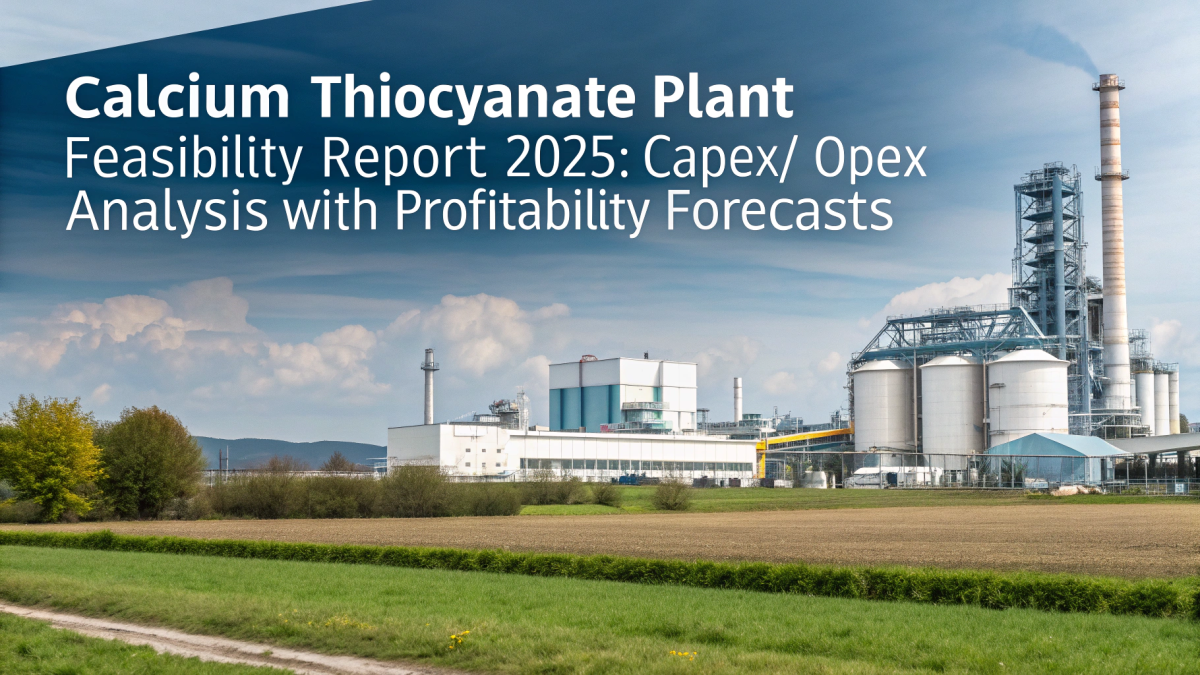
Calcium Thiocyanate Plant Feasibility Report 2025: Capex/Opex Analysis With Profitability Forecasts
Calcium thiocyanate (Ca(SCN)2) is an inorganic compound, a calcium salt of thiocyanic acid. It is a colorless to white crystalline solid that is highly soluble in water. Industrially, it is primarily used in the textile industry as a sizing agent and a mordant, and in the concrete industry as an accelerator for cement setting. Its ability to act as a complexing agent also makes it useful in some chemical synthesis processes.
Setting up a calcium thiocyanate production plant involves several key steps. The primary chemical reaction typically involves reacting calcium carbonate (limestone) or calcium hydroxide with ammonium thiocyanate. The process requires reaction vessels, filtration systems to separate the solid product from the solution, and crystallizers to obtain the final calcium thiocyanate crystals. The plant layout must include storage for raw materials and the final product, as well as waste treatment facilities.
IMARC Group's report, titled “Calcium Thiocyanate Production Cost Analysis 2025: Industry Trends, Plant Setup, Machinery, Raw Materials, Investment Opportunities, Cost and Revenue,” provides a complete roadmap for setting up a calcium thiocyanate production plant. It covers a comprehensive market overview to micro-level information such as unit operations involved, raw material requirements, utility requirements, infrastructure requirements, machinery and technology requirements, manpower requirements, packaging requirements, transportation requirements, etc.
Request for a Sample Report: https://www.imarcgroup.com/calcium-thiocyanate-manufacturing-plant-project-report/requestsample
Calcium Thiocyanate Industry Outlook 2025
The calcium thiocyanate industry is poised for continued growth in 2025, driven by its diverse applications across key sectors. As an important additive in cement for the construction industry, a solvent and hardener in textiles, and an intermediate in chemical manufacturing for pharmaceuticals and dyes, the compound's versatility ensures a steady demand. The market's expansion is further fueled by a global push for sustainable and less toxic chemical alternatives, a trend that favors calcium thiocyanate over some traditional compounds.
Key Insights for Calcium Thiocyanate Production Plant Setup
Detailed Process Flow
-
Product Overview
Unit Operations Involved
Mass Balance and Raw Material Requirements
Quality Assurance Criteria
Technical Tests
Project Details, Requirements, and Costs Involved:
-
Land, Location and Site Development
Plant Layout
Machinery Requirements and Costs
Raw Material Requirements and Costs
Packaging Requirements and Costs
Transportation Requirements and Costs
Utility Requirements and Costs
Human Resource Requirements and Costs
Speak to an Analyst for Customized Report: https://www.imarcgroup.com/request?type=report&id=15695&flag=C
Capital Expenditure (CapEx) and Operational Expenditure (OpEx) Analysis:
Project Economics:
-
Capital Investments
Operating Costs
Expenditure Projections
Revenue Projections
Taxation and Depreciation
Profit Projections
Financial Analysis
Profitability Analysis:
-
Total Income
Total Expenditure
Gross Profit
Gross Margin
Net Profit
Net Margin
Buy Now: https://www.imarcgroup.com/checkout?id=15695&method=1911
Key Cost Components of Setting Up a Calcium Thiocyanate Plant
-
Land and Civil Works: Cost of the site, plus expenses for constructing the plant building, storage facilities, and infrastructure.
Machinery and Technology: The most substantial expense, covering reaction vessels, purification equipment, pumps, and automation systems.
Raw Materials: Initial inventory of calcium oxide and thiocyanic acid, which are essential for production.
Utilities and Infrastructure: Installation of power, water, and waste treatment facilities, including effluent management.
Labor and Manpower: Recruitment and training of skilled and unskilled workers for plant operation and maintenance.
Economic Trends Influencing Calcium Thiocyanate Plant Setup Costs 2025
-
Raw Material Price Volatility: Fluctuations in the cost of key feedstocks like calcium oxide and ammonium thiocyanate are a major factor.
Energy Costs: The production process is energy-intensive, making industrial electricity tariffs a significant influence on operational expenses.
Construction Inflation: Rising costs in industrial construction can increase the initial capital expenditure for building a new plant.
Regulatory Compliance: Stricter environmental regulations necessitate additional investment in pollution control and waste management systems.
Market Demand: Growing demand from industries like construction (as a concrete additive) and agriculture (as a fertilizer additive) can influence pricing and profitability, impacting overall project viability.
Challenges and Considerations for Investors
-
Market Volatility : Prices can fluctuate due to supply chain disruptions and changes in demand from key industries like construction, textiles, and agriculture.
Environmental & Regulatory Risks : The chemical's toxicity poses handling, disposal, and environmental concerns, leading to strict regulations that can impact production costs and market access.
Competition and Substitutes : The market is competitive, with other thiocyanate salts and alternative compounds available, potentially limiting growth and pricing power.
Safety Concerns : Calcium thiocyanate is toxic if ingested or inhaled and can release harmful gases when exposed to certain acids, requiring significant investment in safety protocols.
Conclusion
This report aims to serve as a practical guide for entrepreneurs, investors, and industrial planners exploring opportunities in calcium thiocyanate production. By understanding the cost structure, market dynamics, and operational challenges, stakeholders can make informed decisions and devise sustainable strategies for entry and expansion in the sector.
About Us: IMARC Group is a global management consulting firm that helps the world's most ambitious changemakers to create a lasting impact. The company excel in understanding its client's business priorities and delivering tailored solutions that drive meaningful outcomes. We provide a comprehensive suite of market entry and expansion services. Our offerings include thorough market assessment, feasibility studies, company incorporation assistance, factory setup support, regulatory approvals and licensing navigation, branding, marketing and sales strategies, competitive landscape, and benchmarking analyses, pricing and cost research, and procurement research.
Contact Us:
IMARC Group
134 N 4th St., Brooklyn, NY 11249, USA
Email:
Tel No:(D) +91 120 433 0800
United States: (+1-201971-6302)
Legal Disclaimer:
MENAFN provides the
information “as is” without warranty of any kind. We do not accept
any responsibility or liability for the accuracy, content, images,
videos, licenses, completeness, legality, or reliability of the information
contained in this article. If you have any complaints or copyright
issues related to this article, kindly contact the provider above.


















Comments
No comment